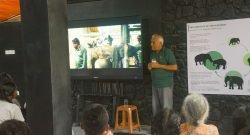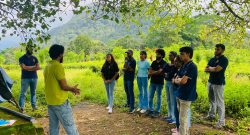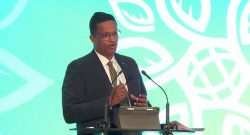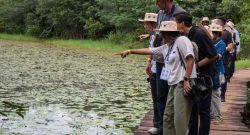Author: Admin
Supporting the Emergency Response in Sri Lanka
The ‘1990 Suwa Seriya’ free ambulance service is a pioneering initiative to provide an emergency medical network covering the entire country. The MJF Group has donated towards seven such ambulances, which are operational across the eastern town of Batticaloa, western hub of Kiribathgoda, the tea regions of Nawalapitiya, Hatton and Nuwara Eliya, and Pelmadulla to the north of the country. Providing emergency care services through our ‘1990 Suwa Seriya’ collaboration is part of our mission to Make the World a Better Tea.
The Last Two Giants of Sinharaja: A Commitment to Conservation
In the heart of Sri Lanka, the UNESCO biodiversity hotspot, the Sinharaja Forest Complex, was once home to a small group of elephants. Over time, for reasons still unclear—whether due to natural causes or human impact—this group has dwindled to just two male elephants. These last two survivors are now facing inevitable extinction. World Elephant Day: A Pledge to Remember On World Elephant Day (August 12th, 2024), Dilmah Tea, in collaboration with the Department of Wildlife Conservation and the Forest Department of Sri Lanka, made a commitment. We pledged to document the lives of these two elephants—aptly named The Last Two Giants of Sinharaja—until their final days. This effort is not just about recording their existence but also about understanding the lessons their lives can teach us. While the thought of their extinction is heartbreaking, we hope that studying their journey will provide valuable insights to help protect other Sri Lankan elephants that still thrive in different parts of the island. A Day of Reflection and Hope The official announcement was made at the Elephant Transit Home (ETH), with Professors Nimal Gunathilleke and Savitri Gunatilleke from the University of Peradeniya. These renowned researchers have been dedicated to the conservation of the Sinharaja Forest Reserve since the 1970s, making their presence at the event deeply significant. Dilmah’s Commitment to Elephant Conservation Our commitment to elephant conservation is not new. Since 2009, we have partnered with the Department of Wildlife Conservation through the Elephant Transit Home. Over the years, we’ve contributed to several initiatives: The Elephant Knowledge Walk: An educational initiative at the ETH premises aimed at raising awareness about the importance of elephant conservation. Radio-Collaring for Research: We have supported the radio-collaring of two elephants to aid scientific research on their behavior and movements. Rehabilitation of Orphaned Elephants: Supporting the rehabilitating and release of three orphaned baby elephants – Amaya, Ted and Baby Dilmah – back into the wild once they reach the appropriate age. We adopted the fourth elephant Dilly in 2023. Looking Forward As we continue to document The Last Two Giants of Sinharaja, we are reminded of the importance of conservation efforts not just for these elephants but for all wildlife in Sri Lanka. The insights gained from this documentation will be crucial in shaping future conservation strategies to ensure that other elephants do not meet the same fate. Our work with the Elephant Transit Home and our ongoing efforts to protect Sri Lanka’s elephants reflect our commitment to make the world a better tea both the environment and the community. Learn more about our elephant conservation initatives here
Planting Season at Endane Biodiversity Corridor
We believe community participation is key to long-term project success in green restoration. That’s why we collaborate with the community around the Endane Biodiversity Corridor. For the 2024 planting season, we invited the larger public to join us. Over 500 volunteers from universities, schools, clubs, institutions, families, and our own Dilmah family came to the Endane Biodiversity Corridor in Ratnapura. Together, they planted over 1,000 saplings – native and endemic varieties nurtured in our Endane plant nursery, with seeds collected from the forest floor near the mother plants. These saplings will be regularly monitored for growth. This wasn’t just a planting exercise. Volunteers learned about creating biodiversity corridors and their benefits to humans, wildlife, and the ecosystem. They visited our nursery, which houses over 1,500 saplings. Each group also enjoyed a nature walk, a refreshing dip in a stream, and a delicious village lunch.
LEOPARDS, PEOPLE AND EVERYTHING
RENOWNED SOUTH AFRICAN CONSERVATIONIST CHATS WITH DILMAH GEN 3S AMRIT ABOUT OVER A CUPPA If you have noticed the decrease in the population of species that you encounter day-in day-out or pass by your windshield, you are the kind of person the world needs now. – Yet have you made an effort to understand why? “What we observe is not nature itself, but nature exposed to our method of questioning” – Werner Heisenberg Dr. Jeanine; Ecologist, Researcher and Conservationist from South Africa, in her recent interview on Leopard Conservation, with Amrit Fernando of Dilmah Ceylon Tea states; the dream of living in co-existence should be to connect habitat patches around the country forming a network, where animals do their own thing and we as humans work in and around it. Why is that important? Habitat fragmentation is a major reason for the decline in species population. Habitat fragmentation, caused by human activities like urban development and agriculture, breaks large habitats into smaller, isolated patches, leading to biodiversity loss and disrupted ecosystem services. Land corridors, or wildlife corridors, are essential as they connect these patches, allowing for species movement and gene flow, thus enhancing genetic diversity and species survival. Metapopulations, consisting of separated populations that interact through migration, rely on these corridors for recolonization and maintaining dynamic stability. Effective conservation strategies prioritize creating and maintaining these corridors to counteract the negative impacts of fragmentation and support ecosystem health. How does habitat fragmentation effect leopards? Leopards, known for their solitary lifestyle, are significantly impacted by habitat fragmentation, leading to increased human-wildlife conflicts and decreased genetic diversity. Female leopards play a crucial role in maintaining population stability, as they establish and defend territories that overlap with their offspring’s ranges, ensuring access to resources and mating opportunities. Why leopards in particular? If you are wandering why concerns are mainly raised around elephants and leopards, Leopard and elephant conservation are priorities because they play crucial roles in ecosystem health. Leopards, as apex predators, control prey populations and maintain balance in their habitat. Elephants, as keystone species, shape their environments through tree felling and seed dispersal, supporting diverse plant and animal life. Protecting these species is vital for preserving biodiversity and ecological stability, as they face significant threats from habitat loss and poaching. What’s a cuppa tea got to do with leopards? Within the fragmented landscape, the leopards find refuge in our tea estates that act as passageways aiding their movement. However, conflicts arise between these animals and the estate community due to lack of awareness. Hence raising awareness is key to minimise these conflicts. Dr Jeanine’s visit took her to do some awareness sessions in some schools in estate areas – Kingsbury Tamil School in Kataboola Estate, and an awareness session for Planters in Nawalapitiya in collaboration with the Wildlife and nature Protection Society and the Department of Wildlife Conservation. How can I contribute? As a corporate, if you are worrying over the cost involved in adhering with sustainability guidelines or environmental regulations, take Dr. Jeanine’s words; It can be expensive to work with nature, but expensive to work against it as well. For example, in agriculture, sustainable practices like crop rotation and organic farming are expensive initially due to specialized equipment and training. Conversely, relying on chemical fertilizers and pesticides may have lower upfront costs but can lead to soil degradation, loss of biodiversity, and contamination, resulting in high future expenses for soil restoration, healthcare, and environmental clean-up. Both approaches involve significant financial investments, emphasizing the trade-offs between immediate and long-term costs. As an urban dweller, if you are thinking you cannot make much of an impact, know that the effort made in finding out how a product is being produced, and underlying sustainability approaches also account. Next time you go shopping, aim to purchase sustainable products over conventional. As a village dweller in close contact with nature, aim to heighten your awareness, tolerate and contribute to the measures undertaken by various authorities in conserving local populations of leopards and other concerned animals in the context. In the current context and stage, being observant is essential, being aware and understanding is crucial, but the willingness to tolerate and make an impact is of utmost importance. For more insights on leopard conservation. Watch the full podcast with Dr. Jeanine here
An appeal to the global tea industry by Dilhan C. Fernando
“As growers, we are on the frontlines of climate action, inequality, gender and most SDGs [UN]. We want to do what is right, but the right and valuable path costs more than the one that price demands of us. Fair wages, access to education, productive soils, great tasting tea, a sustainable, resilient and reliable industry are the responsibility of consumers, retailers, brands, traders and producers equally”, Dilhan C. Fernando appealed to the global tea industry at the Colombo International Tea Convention 2024. Tea is not just the world’s second most popular beverage. Every cuppa is a story of taste, people and planet. Dilmah isn’t just a brand; we are a cause- tea growers on a mission to Make the World a Better Tea as we stay true to our founder, Merrill J. Fernando’s philosophy of business as a matter of human service. Watch Dilmah Chairman/CEO, Dilhan C. Fernando’s full speech. #ColomboInternationalTeaConvention #TeaWithPurpose #Dilmah #TeaInnovation #EthicalTea #TeaCommunity #SustainableLiving #TeaValues #CeylonTea #FamilyBusiness #DilmahFamily #FamilyFirst #TeaWithLove #ServingHumanity #CupOfKindness #EthicalBusiness #Integrity #Tea #EthicalTea #PremiumTea #BetterTea #TeaInspired #GreatTaste #NaturalGoodness #EthicalPurpose #MakingTheWorldABetterTea
Introducing Elixir of Ceylon Tea by Dilmah – Mixology Inspired by Nature
It is a naturally sweetened concentrated tea extract made from the finest single-estate Ceylon Tea on the planet. The tea used is harvested at the Rilhena Estate by handpicking only the tender leaves for maximum freshness, superior taste and antioxidant goodness. The extract is made within hours of harvesting and combined with other flavours and ingredients that are all inspired by nature. With our Elixir you can make an iced tea in a matter of seconds. Just add 1 part of the Elixir into 12 parts of iced water, stir it and just like that you have a crafted iced tea experience. You can also make cocktails, mocktails, slushies, tea sodas, milkshakes, smoothies – the list goes on. Whether you are a professional mixologist working in a bar or love to make drinks at home – this is your must-have ingredient to make what you imagine. With every purchase 15% of pre-taxed profits are pledged to go towards helping the planet and people, ensuring with every bottle sold, we can keep Making the World a Better Tea. Shop at – https://shop.dilmahtea.com/collections/dilmah-elixir-of-ceylon-tea
Dilmah’s Beddagana Wetland Park Project
Dilmah has joined hands in a public private partnership with the Urban Development Authority to improve the Beddagana Wetland Park to increase interest and education value for the wetlands. The partnership was cemented with an MoU sigining between the UDA and Dilmah earlier this year. This falls under Dilmah’s larger efforts at supporting the greening and preservation of important ecosystems This will be a long-term commitment by Dilmah in the interest of preserving and strengthening conservation efforts for an important ecosystem. A long term strategy has been designed by Dilmah consultant Narmada Dangampola that will consists of community awareness and outreach, education programs maintaining throrough recordkeeping of species and infrastructure maintenance. Why is it important to improve conservation for wetlands? From all of wetland patches found in Colombo, the Beddagana Wetland Park has high in biodiversity. It is home to many plant and animal life, some of them endemic and threatened. Bordering the Diyawanna lake, the riverine ecosystem comprises of diversified floral species natice to Asian weltands. Located in an urban area, the wetlands keep the city cool and fights air-borne pollutants and improve the water quality in the area as well. Beddagana Wetland Park is part of the only RAMSAR accredited capital city wetland in the world. The capital city of Sri Lanka, Colombo City is built on a mosaic of thirty-six wetland patches, connected through a nearly 50 km long man-made canal system. Learn more about our green restoration initiatives at www.dilmahconservation.org
Dilmah collaboratively launches Agroforestry Model in Rilhena Sri Lanka
This World Environment Day, we are excited to announce that we are launching an agroforestry model in Rilhena in collaboration with Kahawatte Plantations and Agriculture Innovation Nucleus in Sri Lanka! This is the latest among a host of green restoration initiatives that include our flagship project of building a Biodiversity Corridor through an abandoned tea land to link two separated forest reserves. Our green initiatives align with Sri Lanka’s NDC of restoring forest cover by 32% and the global call to restore 1 billion hectares by 2030. We believe the success of this model will pave the way to extend agroforestry to our other tea estates. The transition from monoculture will have many benefits such as enhancing biodiversity, crop yield, water management, resistance to pests and diseases, soil health and climate resilience. Apart from planting forest trees, we are also planning to establish cash crops such as durians, rambutans, garcinia, and pepper at the site.








